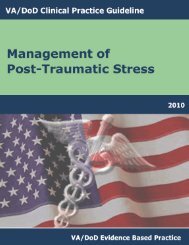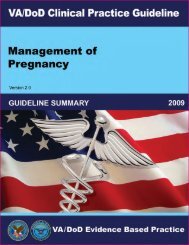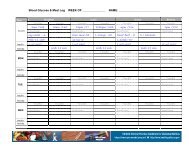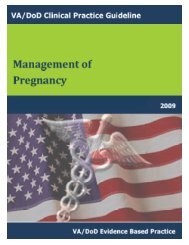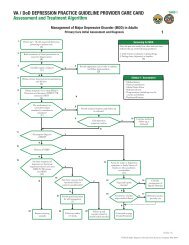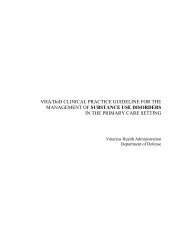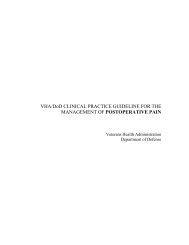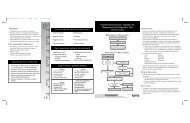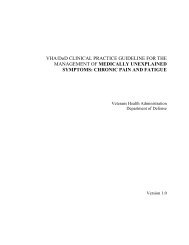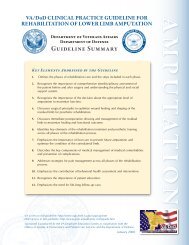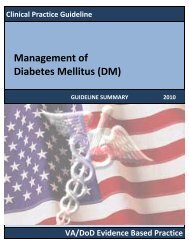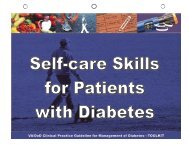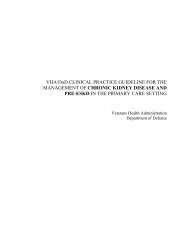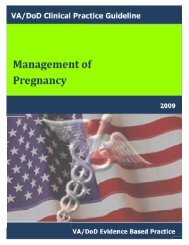DM Full Guideline (2010) - VA/DoD Clinical Practice Guidelines Home
DM Full Guideline (2010) - VA/DoD Clinical Practice Guidelines Home
DM Full Guideline (2010) - VA/DoD Clinical Practice Guidelines Home
You also want an ePaper? Increase the reach of your titles
YUMPU automatically turns print PDFs into web optimized ePapers that Google loves.
Version 4.0<br />
<strong>VA</strong>/<strong>DoD</strong> <strong>Clinical</strong> <strong>Practice</strong> <strong>Guideline</strong><br />
for the Management of Diabetes Mellitus<br />
D. Determine Patient’s Extent of Knowledge and Self-Management Skill Deficit Based on Treatment<br />
Goals<br />
OBJECTIVE<br />
Determine the education and skills enhancement needed to enable the patient to self-manage.<br />
RECOMMENDATIONS<br />
1. Assessment of the following factors should be completed to determine the extent of the patient’s<br />
educational and skills deficit and his/her ability for self-management: knowledge of the diabetes disease<br />
process, treatment goals, management skills, cultural influences, health beliefs/behavior, attitudes,<br />
socioeconomic factors and barriers.<br />
2. Documentation of the patient’s learning needs, abilities including physical and cognitive limitations, or<br />
language barriers, preferences, cultural and religious practices, emotional barriers, health literacy and<br />
numeracy, desire and motivation to learn and/or change, and the financial implications of care choices.<br />
3. Assessment and documentation of the patient’s understanding of education.<br />
DISCUSSION<br />
Diabetes self-management is an active, ongoing process that will change as patients’ situations change. A useful<br />
framework for patient centered diabetes education includes the following self-care behaviors:<br />
• Eating healthy foods<br />
• Getting 30 to 60 minutes of physical activity on most days of the week<br />
• Monitoring<br />
• Taking medications<br />
• Solving Problems<br />
• Reducing risks<br />
• Learning to cope with stress<br />
E. Does the Patient Need Referral for Further Education or Intervention?<br />
OBJECTIVE<br />
Identify patients who are at high-risk for diabetes complications or in need of further educational intervention.<br />
BACKGROUND<br />
Because primary care appointments frequently do not provide adequate time to address background and educational<br />
issues, referrals or additional appointments to address the patient's needs may be required. As patients often present<br />
with complex combinations of educational, treatment, coordination of care, psychosocial, and/or financial issues,<br />
they may benefit from a more in-depth, risk-focused education or intervention. When appropriate, refer for followup<br />
education in a comprehensive DSME program or to a provider/specialist to evaluate and address additional<br />
needs. Medication adherence should be addressed if patients are not meeting goals.<br />
RECOMMENDATIONS<br />
1. Conditions that may warrant risk-focused intervention include:<br />
• Markedly or persistently elevated HbA 1 c (For appropriate HbA 1 c target based on risk stratification, see<br />
Module G: Table G-1).<br />
• Progression to ESRD ( e.g., stage 3-5 CKD)<br />
• Lower extremity complications<br />
• Pregnancy, or planned pregnancy, or woman of child bearing age<br />
• Impaired vision<br />
• Severe psychosocial or economic barriers<br />
• Cognitive impairment or frailty<br />
• Intensive insulin therapy<br />
Module M: Self-management Page 111



